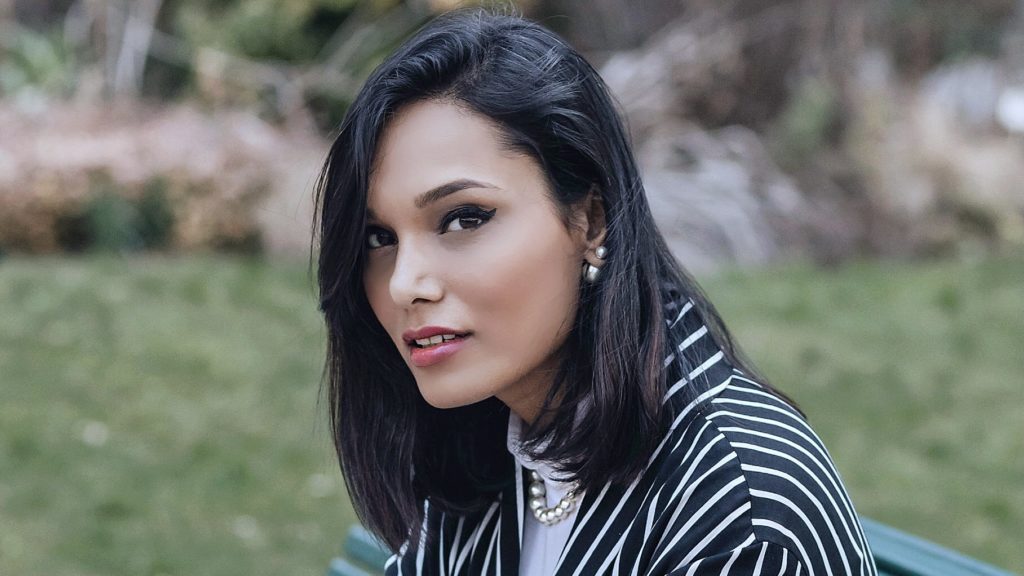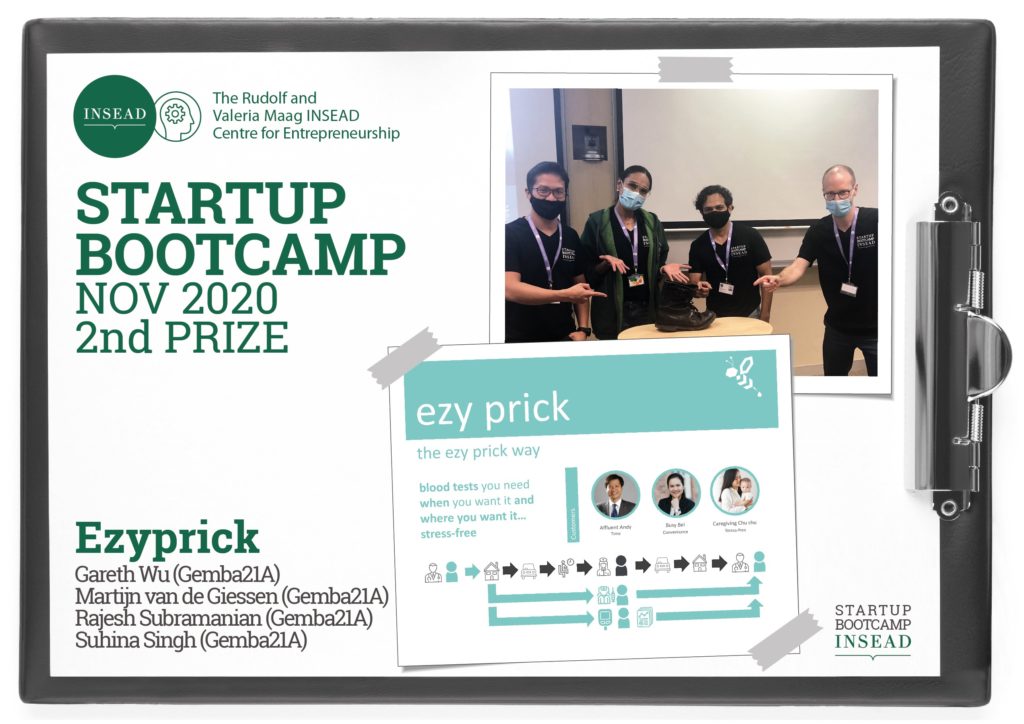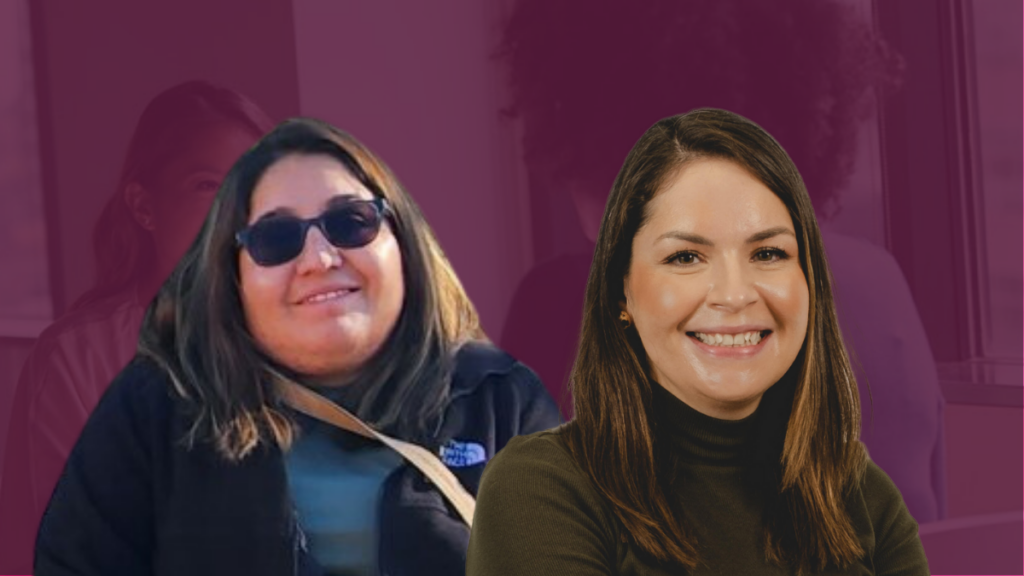Seizing her days in style: Executive MBA grad Dr Suhina Singh Cesenni connects the dots of her multifaceted career journey

MBAchic contributor Xinniella Khubchandani speaks with Dr Suhina Singh Cesenni to discuss her diverse career, her MBA experience and her love for fashion and beauty.
Medical doctor, model, marketer, reality TV star, entrepreneur, healthcare strategist, Executive MBA, healthcare investor, fashion blogger – no, this isn’t just a list of different occupations, but a selection of the multitude of diverse roles that Dr Suhina Singh Cesenni has taken on so far.
Pre-EMBA
Suhina says that healthcare has always been in her DNA, as she speaks to me over Zoom from her home office in Singapore, wearing a turquoise dress, gold charm necklace and AirPods. She jokingly recalls how as a child growing up in South Africa, she would pretend to put her Barbie dolls in hospital and reattach their body parts after they encountered unfortunate incidents at the hands of her (very young at the time) brother! Soon after graduating from medical school at Stellenbosch University and starting her career as a General Practitioner in Cape Town, Suhina quickly became frustrated at the inefficiencies of the South African public healthcare system. “There just had to be a better way,” she recalls, and cites this desire of wanting to make a difference as the driving force which has led her through her career journey to where she is today.
Wanting to experience a different healthcare system, Suhina moved to the UK with the intention of taking her learnings from a developed country’s healthcare system back to South Africa, so that she could contribute to making a change to the South African healthcare system. However, after she completed a Master’s of Science in International Health Management at Imperial College Business School and met Enrico, now her husband, together they decided to move to Singapore, rather than return to South Africa. Suhina doesn’t regret her move to Singapore – she describes the experience of living in Singapore for the past nine years as having been “absolutely incredible”.
“It’s amazing how much you grow when you’re put into an environment that you don’t know. I actually highly recommend that to everyone – to just get a workplace where you don’t know anyone or anything … To start from almost ground zero again in your career – it’s interesting. But at the same time, you just grow so much, because you have no choice – it’s almost like do or die, which I think is great.”
Despite loving Singapore now, Suhina faced challenges when she initially moved there – most notably the barrier of not being able to practice medicine in the country, and then facing rejection in entering Singapore’s healthcare industry in general.
“I think a part of me had lost touch with the young physician that wanted to make a change … It was very difficult – I went through so many months of people telling me no, no, no, no, no, no…”
But it only takes one yes, and Suhina found someone who believed in her; she secured a position as a medical writer for a scientific communications company. Her friends and colleagues thought she was “completely crazy” to take the role given that she was overqualified, but for Suhina, it was a good decision because it gave her the necessary network that led to her later roles in the pharmaceutical industry.
Suhina has worked in a number of different roles in Singapore, and in fact, counts her couple of years outside of the healthcare space at a graduate recruitment technology startup as a pivotal point in her career. It was this experience that piqued her interest in technology and set the direction for the rest of her career.
“The amount that you learn in an early stage startup is just insane. I think if people really want to challenge themselves, a startup is a great way to learn.”
This role led Suhina to rediscover that determination she’d had as a young physician wanting to make a change, that she had temporarily lost.
“I realized that actually there is so much that tech can do to solve some of the problems that we have in healthcare, not just in a mature market, but also within an emerging market.”
The INSEAD Journey
Suhina ended up in medical affairs within the pharmaceutical industry, and it was while working at Sanofi, a global life sciences company, where Suhina was the Asia Lead for Digital Innovation & Multi-Channel engagement, that Suhina decided to apply to business school.
Given that Suhina had had such a global career, it’s no surprise that she studied at INSEAD, “The Business School for the World” as per their slogan, where she completed her Executive MBA (EMBA).
Ever since she was a young physician, Suhina had wanted to study for an MBA in healthcare, but having completed her MSc and thinking she was too old, she thought she had “missed the boat” and was prepared to give up on the dream.
The turning point, Suhina says, happened after being “shattered” at losing an opportunity for an internal move at Sanofi to another candidate. To help with her disappointment, she looked to her support network – a recurring theme in my conversation with Suhina, and a factor that she counts as integral to her success. Suhina met with a close friend for brunch who planted the idea of doing an EMBA, a degree designed for those with a significant amount of professional experience who do not wish to take time out of their careers to study for a traditional one or two year full-time MBA.

Not one to mull things over for too long, Suhina quickly got working on her application and taking her entrance exams, and she started her EMBA less than 5 months after that initial brunch conversation!
“It was not as planned as most people’s MBA journeys, yet at the same time it’s something I knew I wanted to do when I was younger. I just think that it happened at the right time. I can’t imagine doing the MBA any earlier or later.”
Does Suhina have any advice for those who are considering an MBA but are unsure of their career goals or unsure when would be a good time to do it?
You don’t lose anything by applying.
“I think you never know when is a good time. Seize the opportunity is what I say. There are a lot of friends of mine who were contemplating the Executive MBA or the MBA. I just say stop umming and ahing about it – open up that application and start filling it out!
“We spend so much time thinking about whether we should or shouldn’t do something, but if you’ve never actually tried to get in, if you’ve never actually put your name out there, then you just don’t know – then the option doesn’t exist.
“You can apply, and then if you decide actually, I don’t want to go, I want to defer by a year – okay! But you’ve already applied and you already have that option in hand, as opposed to … spending one year, two years, three years, four years thinking about it.
“I think sometimes you need to live in the moment, and be proactive and say “I want to make this happen. I will see if at least it’s an option, and just apply. You don’t lose anything by applying.”

Balancing the work and reading she had to do for her MBA on top of her full-time job at Sanofi was a challenge that she had completely underestimated – it proved to be almost as intense as medical school. This challenge was exacerbated by the onset of the pandemic – being responsible for digital innovation and multi-channel engagement during a global pandemic meant that Suhina was extremely busy in her role at Sanofi. She cites having a wonderful boss at the time – which goes back to the recurring theme in my conversation with her of having a great support network – as vital in managing this, and is extremely grateful to him for supporting her and encouraging her to take time out for herself. Suhina doubts she would be where she is now without his support, and says that if you are studying for an EMBA, it’s crucial to have the support of not only your family, but also your colleagues and particularly your boss.
Although tough to manage at times, Suhina counts her time at INSEAD as “one of the best experiences” she’s had and the “best investment” in herself, that she would highly recommend to others.
The three main things that Suhina feels that she has gained from doing the Executive MBA at INSEAD:
- The professional growth
Where the Master’s degree Suhina had completed earlier in her career sparked new ideas for her, the EMBA significantly expanded her perspective.
“The Master’s that I did in Imperial in my younger days … sort of switched on the lights in a room.
“The Executive MBA made that room so much brighter that I could see that actually there are other rooms that exist and they’re not completely in darkness. They are lit up to a degree. You just have a much greater perspective. So I think there’s a lot of professional growth.”
- The network she built
Despite the inevitable virtual nature of Suhina’s EMBA experience, she is confident she will have her INSEAD network for life.
“At INSEAD it’s almost as if we have this family in a way, and the amount of support you get is just insane. There are no words to really describe [the power of that network]. And for that, I’m incredibly grateful. “
- Personal growth
Unlike developing professionally and building her network, which she had expected, Suhina was surprised at the amount of personal growth she experienced during her EMBA.
“In the Executive MBA at INSEAD, there’s something called the Leadership Development Program … It really goes down to the core of who you are as an individual and how that also affects your leadership and what your purpose is. I think that there’s a lot of personal growth that happens through that.
“And while you’re doing that journey in the Executive MBA, you actually start to become more aware of how you interact within a group. You get to reflect on group work … you get to learn yourself a lot more and to experiment with things within groups within the way that you manage things.”
Adaptability, leadership and managing setbacks
Suhina was particularly impressed with the way INSEAD adapted to the pandemic. Of course the move to online classes and exams were less than ideal, but Suhina thinks it’s important to be able to pivot quickly, and praises the way that INSEAD handled this, although she thinks that the in-person experience is better than the online experience.
“The value with anything in life is what you make of it … I know there’s always the opportunity to meet up for different events or to go back … In my opinion, you still get the value.”
Adaptability is certainly something that Suhina is not a stranger to. She shares her words of wisdom:
“It’s impossible to know everything …I think that fundamentally the most important thing about being adaptable is just being curious and … just being open. I think if you’re not open to change, then it’s very hard to change.”
Suhina hasn’t had a problem with having an open mind, but she has had a tendency to get stuck-in to problems and “treat everything like a dying patient”. This has sometimes meant that she has lost perspective and become less mindful of those around her, letting her determination to drive cost efficiencies and get work done quickly take over without taking a step back to consider the roles of those around her.
“Something I’ve definitely learned over the years is to not go bulldozing full steam ahead. There are times where that’s needed, but more often than not, you will need to make sure that you have people aligned before you try and move forward.”
| If you could have dinner with three people living or dead, who would they be? | Steve Jobs, Nelson Mandela (I actually did meet him!) and I can’t think of a third one, but definitely those two! |
| Best piece of career advice you’ve ever received? | To stop stressing and to put myself out there and then see what happens. I tended to feel I needed to know everything before I could do something, which is not necessarily the case – you can learn and do things at the same time. It’s not black and white – there is a gray scale! |
| Worst piece of career advice you’ve ever received? | While I was working on a health tech idea, an oncology solution, I was told by a number of people that it wouldn’t work and that it was a silly idea – I listened to them and I probably shouldn’t have. You’ve got to believe in yourself and your vision, and go for it. The worst thing that can happen is that you fail, but then you will learn from failing. So I think if someone tells you something is a bad idea, it’s not necessarily a bad idea – it depends. |
| Favourite class at INSEAD? | There were so many classes that I absolutely loved! I think the one I loved the most was Managing Corporate Turnaround, where you work in groups on a case to turn around a company. You bring everything you’ve learned beforehand into turning around and determining the best decisions for the company, which was based on a real company. It’s an intense 3-4 days, but it was a lot of fun! |
| Dream job when you were a kid? | Singer, but I can’t even sing! |
| Your latest TV binge watch? | The Mandalorian – it’s cute and quite entertaining! My sister and nephew recommended it. I absolutely love Star Wars and Marvel, so I’m a big fan of Disney Plus! |
| Best book you’ve read in the last year? | The one I’m reading now – Lean Analytics: Use Data to Build a Better Startup Fast by Alistair Croll and Benjamin Yoskovitz. |
| Your go-to power breakfast? | It sounds boring but I eat the same thing every morning – steel-cut oats with almonds, and a cup of coffee. |
| Your must-have skincare product for long days? | I absolutely love the Dior Capture Totale Dreamskin – it’s a primer (to be applied before makeup) and it gives you absolutely flawless skin. It’s my favourite product ever. |
| Your favourite fashion designer? | Kim Jones. He was amazing at Louis Vuitton when he was doing menswear, and then he took on Dior menswear – I ended up buying Dior menswear for myself. I think he’s incredible. |
Following on from the fact that Suhina certainly counts having a strong support network as essential to her success, friends and mentors have been important in influencing Suhina’s own leadership style. Suhina emphasises that she looks to several different people in her life – inspiring colleagues, incredible friends – for qualities that she admires and wants to incorporate into her own leadership style, rather than having one “perfect” mentor. She recounts particularly liking the way that Paul Hudson, CEO of Sanofi, communicated in a humble and approachable way to the whole organisation, and hopes to be “half as good” a CEO as Paul Hudson in terms of leadership and communication.
“I think also having really good friends around you really helps because sometimes you land up in really precarious situations at work and you don’t really know how to navigate the situation. In those situations, it’s very helpful to have friends.
“You can go into a really dark space, especially when it’s your 10th or 12th rejection, or you don’t hear back from HR and it’s just a tense time. You start to think, okay, what’s wrong with me now? So it really helps to have a support network around you to also add some objectivity around the situation.”
Aside from having a strong support network, does Suhina have any other advice for dealing with rejection?
“I mean, I don’t think there’s any easy way to deal with rejection! I think some of the lowest moments I’ve had was when I first moved [to Singapore]. It really knocks your confidence and sometimes it’s really hard to get back up and keep trying. It’s really not easy.
“It’s okay to have a pity party –
just don’t get stuck on it.”
“I think for me, the one thing I’ve learned to do, especially with rejection, is it’s okay to have a pity party – just don’t get stuck in it … I usually give myself a day or two to feel absolutely horrid about it, feel the rejection, and then [I] move on.”
Despite her plenitude of successes, Suhina still struggles with imposter syndrome. Suhina recalls being a perfectionist from her high school days, and not being satisfied with any room for error.
“[The imposter syndrome has] never really gone away, but I think I learned to live with it a lot better … One thing I’ve learned is recognising that it’s okay not to know everything and it’s okay to lead without knowing everything – most people do, and part of being a good leader is hiring people that make up for the skillsets or deficit knowledge that you don’t have.”
Suhina proactively manages her imposter syndrome – last year she tried positive affirmations, and Paraliminals, which are meditative audio books designed to relax and condition your mind around various aspects of your life. She finds that these really help her to calm down.
Not only that – Suhina reaches behind her desk to unplug something she wants to show me – a neon light that reads “You can”.

“My dad, when we were growing up, always said to never use the word “can’t”, because it really shouldn’t exist in your vocabulary.
“Every time I’m having a moment, I just look to the side and I have a neon light that says you can. Every time I think I can’t do this – you can do it!
“It’s funny because when it comes to myself, I always think I can’t do something, but if there’s a problem at hand that I need to solve and someone tells me that it’s impossible, I [say] “No, of course it’s possible. The word itself says ‘I’m possible’! There’s always a way to solve something! … But if it’s for me personally, then I have serious issues of doubt.”
Combining pleasure with business: two worlds became one
Outside of work, Suhina is the face of @LuxITGirl, her fashion Instagram account which boasts a following of over 53,000. Her love of fashion, she says, originates from her mother and sister, and despite having modelled while a medical student, being a Miss South Africa finalist, and even participating in a reality TV show which involved living with 24 other models in a mansion, she has always chosen healthcare over beauty and fashion as a career choice. In fact, it is only in recent years that she stopped feeling that she had to separate her Instagram fashion persona from her professional persona.
Suhina says having an interest in beauty and fashion “can be seen as a huge negative” when you work in healthcare.
“I was really quite conflicted, because I would feel ‘I’m a healthcare professional, I need to dress in this way,’ or ‘I can’t really be that fashionable’ or ‘I can’t love makeup as much’, or ‘I can’t do this and I can’t do that’ – but they’re both two sides of who I am.
“And sometimes I feel you actually get judged negatively if you absolutely love fashion and you happen to have an Instagram account or because you used to model before. Some of the judgments I’ve gotten in the past [have implied the] usual connotation that models are stupid, and that’s not true. I think it’s a very terrible judgement that exists.”

Suhina now proudly displays that she is behind LuxITGirl on her LinkedIn profile. It’s part of who she is, and a few years ago while working at Sanofi, she realised that being an influencer and working in a multi-channel engagement role were complimentary. She believes that attitudes are changing.
“I do think that people are more accepting that there are different parts to a person … and that people are multifaceted. So that’s also made me think that it’s time to be all of who I am instead of two separate people.”
Looking back on her journey as an EMBA graduate
Suhina is currently a healthcare investor at a private holding company MACAN, backed by European families, that she and her husband run, having graduated from her Executive MBA at INSEAD.
“[During the MBA] we were asked, where do you see yourself in 10 years from now? And it dawned on me that 10 years from now, I want to start a career in investing in healthcare. And then I thought, well, gosh, in 10 years, I’m 50, so I should probably start today so that in 10 years I actually am an accomplished investor! So that’s exactly what led me down my current path.”
She says that none of her career was planned, but looking back, she is able to “connect the dots” and find that she has fundamentally had the same goal all along. “[When people ask me why healthcare investing] it’s the same thing that drove me to the UK all those years ago as a young physician – wanting to make a difference within healthcare is the same thing that drives me today.”
On the face of it, investing seems to be a world away from medicine, but in many ways, work in the two fields can be similar. Similar to a doctor assessing a patient and diagnosing a problem, investing also revolves around problem solving – you’re trying to understand how the company functions and analysing it through due diligence – the set of logical steps you follow are quite similar, but “instead of a human body, it’s a company!”
Suhina says that the EMBA really helped her to reflect on her career journey and decide what she would do next.
“As you build experience, you actually uncover other things that you enjoy or, you know, you find your purpose again.
“I’ve always wanted to change things or find a better way of doing things … I just lost touch with that part of me for some time, when I moved [to Singapore] because I was so busy being caught up in … working within a large MNC and thinking ‘I need to get ahead’.
“It’s amazing how the Executive MBA helps you take that step back. It’s almost as if you get to pause for a second, even in the craziness of an MBA, and really reflect back on some of the more important questions. That reflection actually helps a lot in defining the next stage in your life. I think people undergo a number of different changes in their career and in their life. And I think that for me, [realising where I wanted to be in 10 years] was a very defining moment during the Executive MBA.”

Photos provided by Dr. Suhina Singh Cesenni and Tatler Singapore










Amazing multifaceted journey
Impressed with your perseverance am determination
This is an inspiring interview on a number of levels, particularly around embracing all of your gifts and passions and how that can enrich (or 10x) your career and experiences — also such a well-crafted piece, @Xinniella Khubchandani – thank you both!